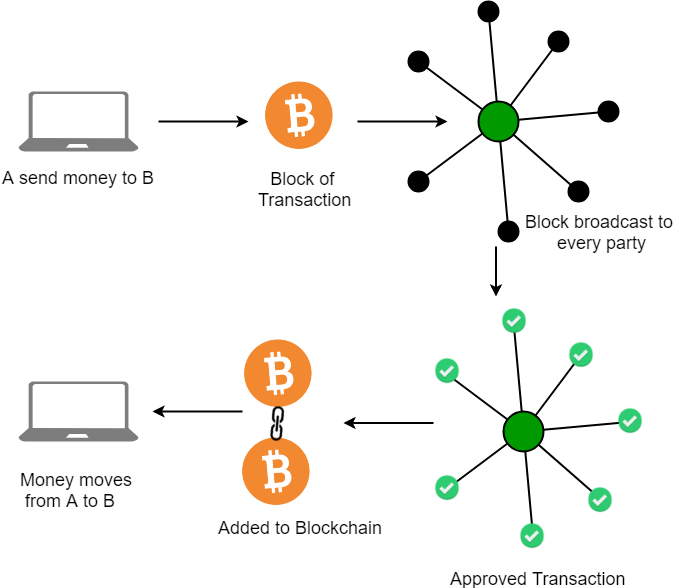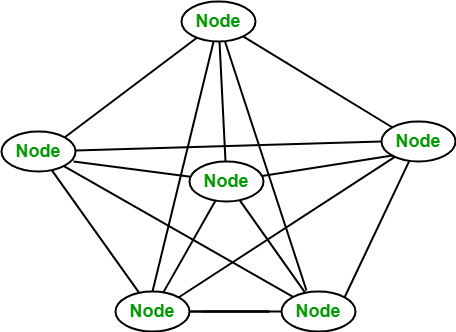Blockchain could be a data structure that could be a growing list of information blocks. The knowledge blocks area unit coupled along, such recent blocks can’t be removed or altered. Blockchain is the backbone Technology of the Digital CryptoCurrency BitCoin.
What is Blockchain?
The distributed database known as the blockchain contains records of every digital event or transaction that has been carried out and disseminated among involved parties. The vast majority of system users validate every transaction.
It includes all of the transaction’s records. The most well-known cryptocurrency and an illustration of the blockchain is Bitcoin. In 2008, a person or group of people going by the name of “Satoshi Nakamoto” released a white paper titled “BitCoin: A Peer-to-Peer Electronic Cash System,” which marked the beginning of blockchain technology.
Blockchain technology makes transactions uncorruptible by recording them in a digital ledger that is dispersed across a network. Anything valuable, such as cars or land assets, can be recorded as a transaction on a blockchain.
How does Blockchain Technology Work?
One of the famous use of Blockchain is Bitcoin. Bitcoin is a cryptocurrency and is used to exchange digital assets online. Bitcoin uses cryptographic proof instead of third-party trust for two parties to execute transactions over the Internet. Each transaction protects through a digital signature.

Blockchain Decentralization
There is no Central Server or System which keeps the data of the Blockchain. The data is distributed over Millions of Computers around the world which are connected to the Blockchain. This system allows the Notarization of Data as it is present on every Node and is publicly verifiable.

Blockchain nodes
A computer linked to the Blockchain Network is called a node. The client is used to connect the node to the blockchain. Transactions are verified and propagated into the Blockchain with the client’s assistance. A copy of the Blockchain data is downloaded into the system when a computer connects to the Blockchain, and the node updates to the most recent block of data on the Blockchain. Miners are the Blockchain-connected nodes that assist in carrying out a transaction in exchange for a reward.

Disadvantages of the current transaction system:
- Cash can only be used in low-amount transactions locally.
- The huge waiting time in the processing of transactions.
- The need for a third party for verification and execution of Transactions makes the process complex.
- If the Central Server like Banks is compromised, the whole system is affected including the participants.
- Organizations doing validation charge high process thus making the process expensive.
Building trust with Blockchain: Blockchain enhances trust across a business network. It’s not that you can’t trust those who you conduct business with it’s that you don’t need to when operating on a Blockchain network. Blockchain builds trust through the following five attributes:
- Distributed: Every incoming transaction between the nodes linked to the Blockchain updates and shares the distributed ledger. Since there is no central server in charge of the data, everything is done in real time.
- Secure: The blockchain is protected from unwanted access by cryptography and permissions.
- Transparent: All transaction data is accessible to all nodes and participants in the blockchain since each one has a copy of the blockchain data. Without the assistance of intermediaries, they are able to independently confirm the identities.
- Consensus-based: For a transaction to be considered legitimate, all pertinent network users must concur. Consensus algorithms are used to accomplish this.
- Flexible: The platform allows for the writing of smart contracts that are executed in response to specific conditions. Blockchain networks are able to change quickly.
What are the benefits of Blockchain?
- Time-saving: No central Authority verification is needed for settlements making the process faster and cheaper.
- Cost-saving: A Blockchain network reduces expenses in several ways. No need for third-party verification. Participants can share assets directly. Intermediaries are reduced. Transaction efforts are minimized as every participant has a copy of the shared ledger.
- Tighter security: No one can tamper with Blockchain Data as it is shared among millions of Participants. The system is safe against cybercrimes and Fraud.
- Collaboration: It permits every party to interact directly with one another while not requiring third-party negotiation.
- Reliability: Blockchain certifies and verifies the identities of every interested party. This removes double records, reducing rates and accelerating transactions.
Application of Blockchain
- Prominent investment banking firms, including Citigroup, JP Morgan Chase, Goldman Sachs, and Credit Suisse, have made investments in blockchain technology and are testing ways to enhance and safeguard the banking experience.
- The accountants are taking the same route as the banking industry. Spreadsheets for financial statements that include a wealth of institutional and personal data are part of the vast amount of data involved in accounting. Consequently, blockchain technology can be integrated with accounting to facilitate the tracking of sensitive and private information while lowering fraud and human error. Deloitte, PwC, KPMG, and EY industry experts are implementing blockchain-based technologies with ease.
- Booking a Flight requires sensitive data ranging from the passenger’s name, credit card numbers, immigration details, identification, destinations, and sometimes even accommodation and travel information. So sensitive data can be secured using blockchain technology. Russian Airlines are working towards the same.
- Various industries, including hotel services, pay a significant amount ranging from 18-22% of their revenue to third-party agencies. Using blockchain, the involvement of the middleman is cut short and allows interaction directly with the consumer ensuring benefits to both parties. Winding Tree works extensively with Lufthansa, AirFrance, AirCanada, and Etihad Airways to cut short third-party operators charging high fees.
- Barclays uses Blockchain to streamline the Know Your Customer (KYC) and Fund Transfer processes while filling patents against these features.
- Visa uses Blockchain to deal with business-to-business payment services.
- Blockchain technology is used by Unilever to monitor all supply chain transactions and ensure that the product is of high quality throughout the entire process.
- Walmart has been tracking its food products from farmers to consumers using blockchain technology for a while now. They allow the buyer to view the product’s history from the point of origin.
- Accenture and DHL collaborate to trace the origin of medications until they are delivered to the customer.
- Leading pharmaceutical company Pfizer has created a blockchain system to monitor and control the stock of medications.
- The Dubai government is eager to make their city the first to fully rely on blockchain technology, even in official offices.
- Along with the above organizations, leading tech companies like Google, Microsoft, Amazon, IBM, Facebook, TCS, Oracle, Samsung, NVIDIA, Accenture, and PayPal, are working on Blockchain extensively.
Is Blockchain Secure?
Nowadays, as the blockchain industry is increasing day by day, a question arises is Blockchain safe? or how safe is blockchain? As we know after a block has been added to the end of the blockchain, previous blocks cannot be changed. If a change in data is tried to be made then it keeps on changing the Hash blocks, but with this change, there will be a rejection as there are no similarities with the previous block.
Just imagine there is a who hacker runs a node on a blockchain network, he wants to alter a blockchain and steal cryptocurrency from everyone else. With a change in the copy, they would have to convince the other nodes that their copy was valid.
They would need to control a majority of the network to do this and insert it at just the right moment. This is known as a 51% attack because you need to control more than 50% of the network to attempt it.
Timing would be everything in this type of attack—by the time the hacker takes any action, the network is likely to have moved past the blocks they were trying to alter.
Blockchain project ideas
Here are a few project ideas for beginners looking to learn more about blockchain technology:
- Create a basic application for a cryptocurrency wallet that enables users to send and receive digital assets.
- Blockchain Explorer: Create an online tool that lets people examine and look up transactions on a particular blockchain.
- Smart Contract: To handle a digital token or asset, put in place a basic smart contract on the Ethereum blockchain.
- Voting System: Develop a blockchain-based voting system that preserves voter anonymity while enabling safe, transparent voting.
- Supply Chain Management: Provide more transparency and traceability by creating a blockchain-based system to monitor the flow of products and services via a supply chain.
- Decentralized marketplace: Using blockchain technology, establish a decentralized marketplace where consumers may purchase goods and services directly from sellers without the need for a middleman.
- Identity Management: Provide a decentralized digital identity management system that enables users to safely exchange and manage their personal data.
These are just a few examples, there are many other possibilities to explore within Blockchain technology.
Future Scope of Blockchain Technology
Blockchain technology has the potential to revolutionize a number of industries, including supply chain management, finance, and the Internet of Things (IoT). Some possible future applications for blockchain include the following:
- Digital Identity: Digital IDs based on blockchain technology may be used to securely store personal information and provide a way to authenticate identity without requiring a central authority.
- Smart Contracts: Self-executing contracts with the contents of the agreement written directly into lines of code, smart contracts have the potential to automate a wide range of legal and financial processes.
- Decentralized Finance (DeFi): Peer-to-peer transactions could be supported by decentralized financial systems that eliminate traditional middlemen like banks by utilizing blockchain technology.
- Supply Chain Management: By using blockchain technology to provide a permanent record of the movement of products and services, the entire supply chain may become more transparent and traceable.
-Internet of Things (IoT): Blockchain technology may be used to build decentralized, secure networks for IoT devices, enabling them to exchange data and communicate with one another in an anonymous, safe manner.
In general, blockchain technology is still in its early stages and has a wide range of potential applications.
It might ne helpful:
Unlocking the Future: Advancements in AI Chatbots
Does Salesforce Use Blockchain?




 WhatsApp us
WhatsApp us